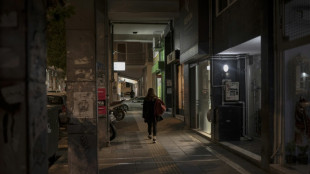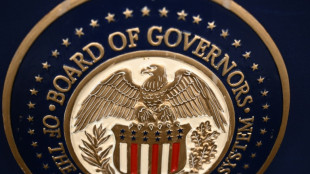

'Always on alert': surviving homelessness in New York City
Sekou Salaam knows all too well the dangers of living on New York's streets. Homeless for six months, he says he's been beaten with a metal pipe and repeatedly threatened with knives.
"It's real out here. You can get hurt, you can get killed," the 55-year-old told AFP, after eating a free lunch at the Bowery Mission, which helps poor and hungry New Yorkers, in Lower Manhattan.
The dangers facing America's homeless were highlighted earlier this month when a man murdered two homeless men and wounded three others during a string of shootings in New York and Washington.
Activists say attacks on homeless people in the United States are rising as the pandemic compounds mental illness and drug addiction and as gun crime soars.
They also accuse politicians of worsening the problem with policies that stigmatize the homeless.
The shootings on the second weekend of March as the men slept outdoors spread fear amongst New York's roughly 50,000 homeless.
"I was alarmed, like whoa I'll be careful where I lay my head," said Salaam, who often seeks refuge in outdoor dining sheds that have proliferated during the pandemic.
"But you can't protect yourself while you're asleep," he added. "People are able to steal from you, so obviously they're gonna be able to kill you."
Thirty-nine-year-old Arnie Medero, homeless for five years, says "precautions" he takes to stay safe include never sleeping in the same spot and scattering broken glass so he hears people coming.
"I'm always on alert. My guard is always up," he told AFP.
- Mental illness -
Data compiled by the city show that the number of homeless murdered in New York City soared from seven in 2018 to 22 in 2021.
In October 2019, four were beaten to death with a pipe by another homeless man in a killing spree in Manhattan.
Although there are no nationwide statistics, because most police departments don't track housing status, the National Coalition for the Homeless believes attacks are increasing across the country.
"Anecdotally, we can say that the numbers are increasing. Violence is definitely on the rise," executive director Donald Whitehead told AFP.
On March 15, Washington police charged 30-year-old Gerald Brevard III with first-degree murder for the New York and Washington shootings. He has a lengthy criminal record and history of mental illness.
Salaam, who has a crack addiction, has been homeless since spending two months in Rikers prison on robbery charges. He says he's seen violence committed amongst homeless people and by non-homeless on the homeless.
Both he and Medero say living on the streets is getting more dangerous and more difficult.
"There's people out of work, people can't give to charity like they used to, there's a lot of people suffering from psychosis," said Medero, who gradually slid into homelessness after he "stopped caring" following a breakup.
The Coalition for the Homeless says homelessness in New York City is at its highest level since the Great Depression of the 1930s.
It recorded almost 48,500 people sleeping in the city's shelter system in January, up 15 percent, from a decade ago.
Salaam and Medero say they prefer to take their chances on the streets rather than the shelters, citing overcrowding and violence. They can wash at privately run centers like the Bowery Mission.
- Subway crackdown -
Jovada Senhouse, 56, lived in various shelters for five years. She says there were often dozens of women sharing a bathroom.
"There's no privacy. There's fights and arguments. It's like being in jail," Senhouse told AFP.
New York Mayor Eric Adams recently instructed police to remove homeless people from the subway, a sanctuary of sorts during the Big Apple's bitterly cold winters.
Activists say the policy makes life more dangerous for those without homes.
"Many unsheltered New Yorkers choose to bed down in the subways because that is where they feel the most safe in the absence of housing and low-barrier shelters," said Coalition for the Homeless policy director Jacquelyn Simone.
Seth Pollack, an organizer at the non-profit Housing Works, says the policy also contributes to society viewing homeless people as criminals.
"When he (Adams) speaks of homelessness as an inconvenience to people who have housing, that dehumanizes people who are suffering the most today," he told AFP.
The mayor's office did not respond to requests for comment.
Advocacy groups say the primary cause of homelessness is a lack of affordable housing. Rather than throwing money at shelters, they want more permanent, private accommodation built.
"Things just need to change. They got to understand that homeless people are human too," said Senhouse.
A.Thys--JdB



